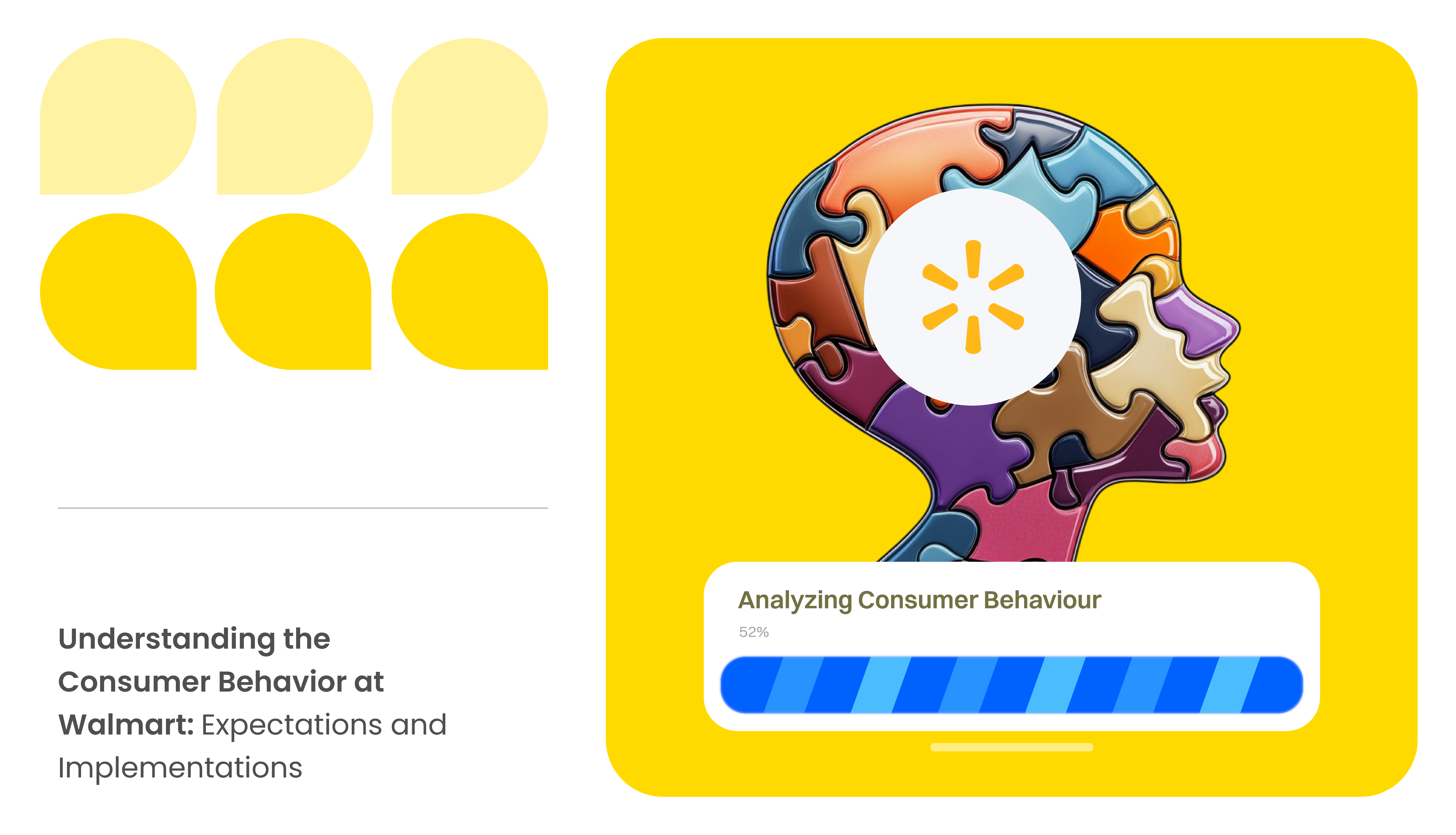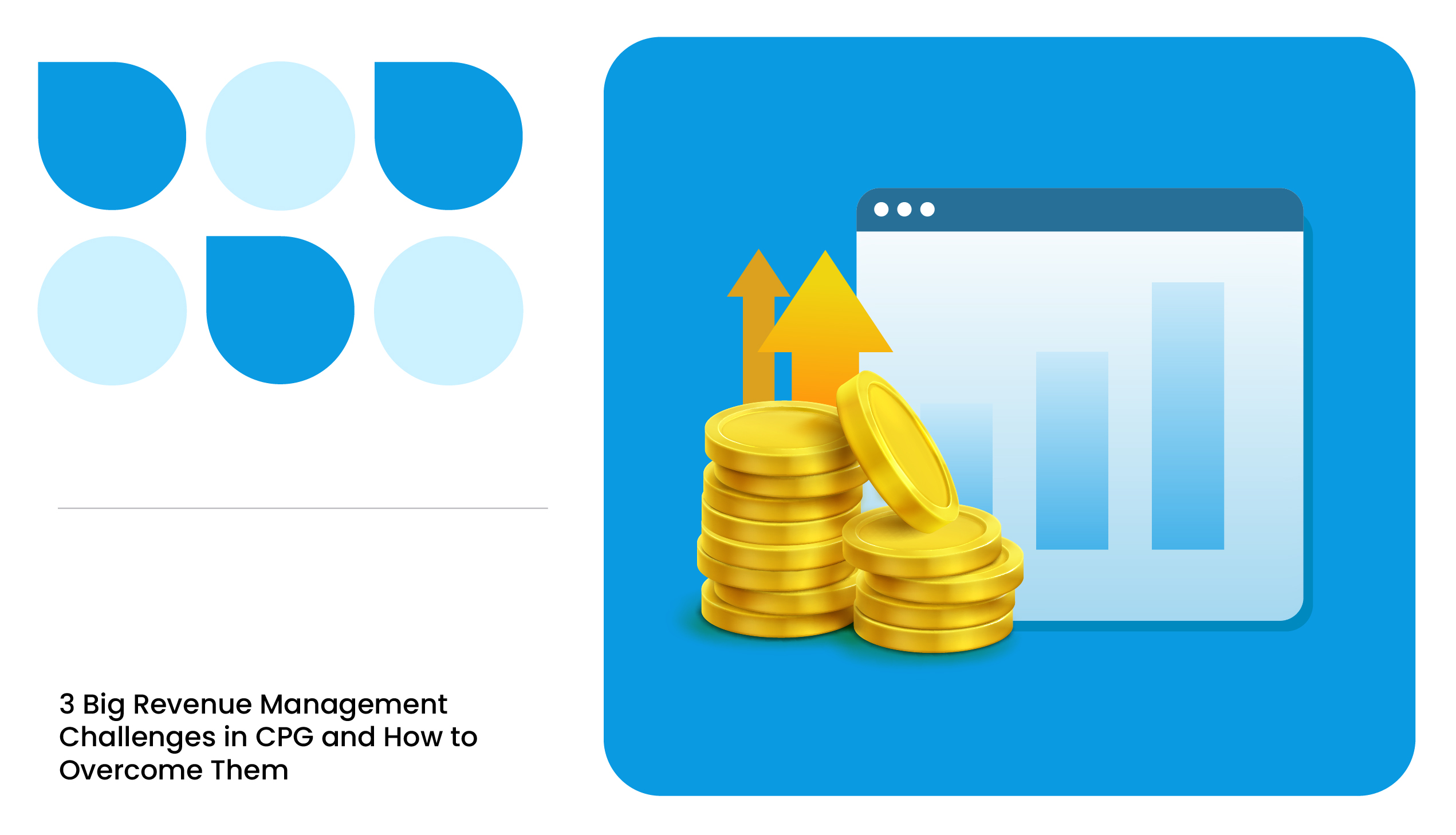According to Business Insider, Walmart is the largest retailer in the world, with a revenue of $648 billion recorded in 2023. It has around 4,600 supercenters, discount stores, and neighborhood markets and has an employee count of 1.6 million.
In its Q4 FY25 earnings report, Walmart continued to demonstrate strong performance, with total revenues increasing by 4.1% and operating income growing by 8.3%.
The company’s global e-commerce experienced a 16% growth, with penetration up across all segments. Walmart’s US comparable sales rose by 4.6%, reflecting positive growth in general merchandise.
These statistics make Walmart a prominent presence in the US retail and e-commerce sector. Walmart has acquired this status through decades of persistence in putting the consumer at the heart of the business
Walmart’s History: A Consumer-First Philosophy
Walmart’s founder, Sam Walton, believed it was possible to offer low prices and a great customer experience simultaneously. This led to Walmart’s famous pricing strategy, known as Everyday Low Pricing or EDLP.
Walmart always focuses on local communities and their needs, so it became synonymous with a customer-friendly shopping space for groceries and other essential goods.
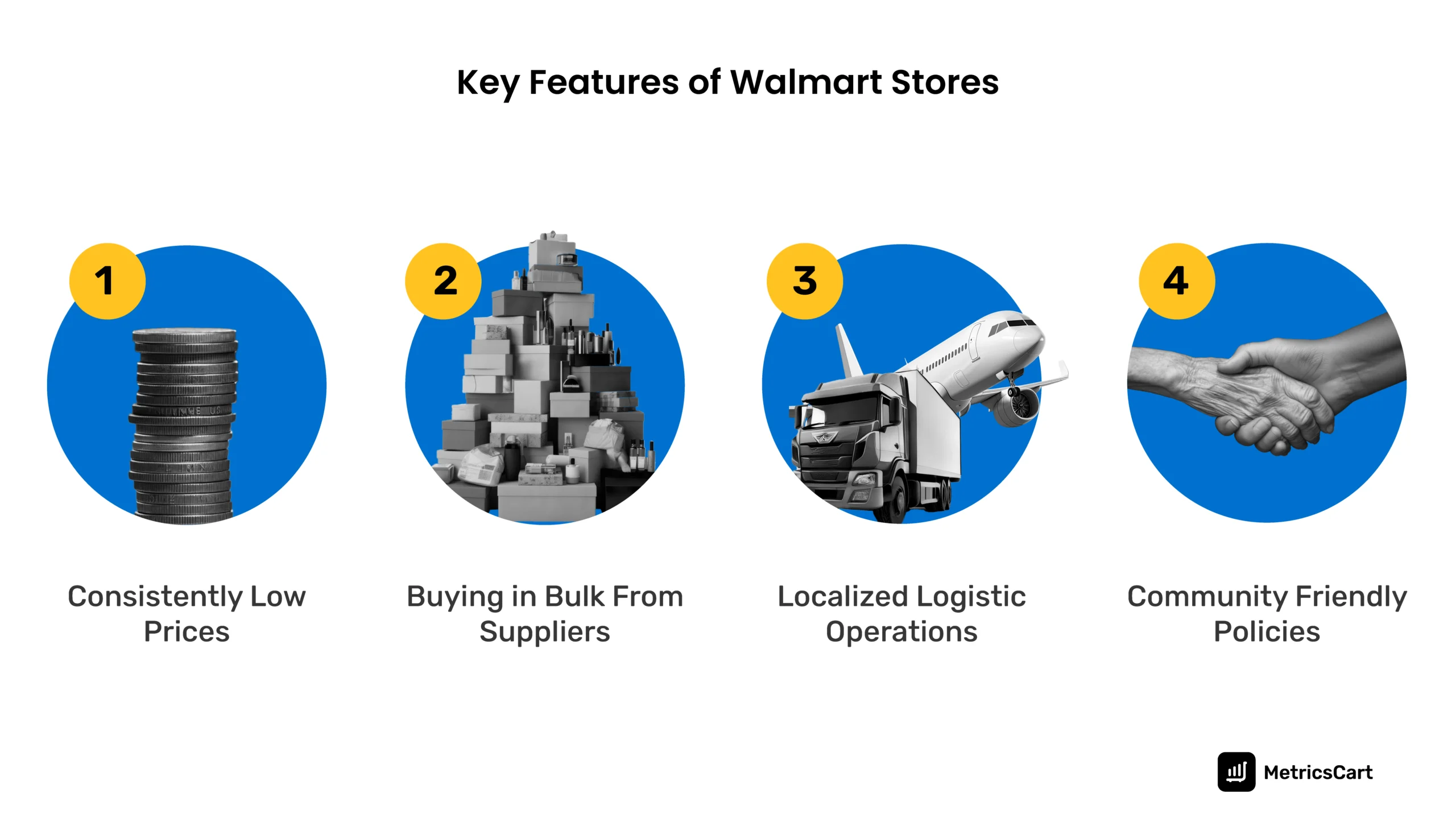
The company runs on the philosophy of servant leadership, where the management supports the store associates in understanding Walmart shoppers better. This translates to efficient store management and customer satisfaction.
Walmart Customer Demographics: Consumer Profile
The latest demographic analysis on Walmart suggests that the typical consumer at Walmart is a white woman aged 60-78 who settled in the suburbs and prefers grocery shopping by visiting Walmart more than once a week. This sort of consumer data profiling allows Walmart to improve its services and create better offers for the benefit of all consumers.
Walmart Services and Offers: An Evolving Timeline
So why do people shop at Walmart? Since its inception, Walmart has tried to position itself as a consumer-friendly retailer focusing on local communities and their shopping preferences.
Sustaining a business for over half a century and becoming one of the largest retailers requires implementing value-based services to its consumers.
In recent years, Walmart has experienced a notable shift in its customer base, attracting a growing number of high-income shoppers.
This trend is attributed to several strategic initiatives aimed at enhancing the shopping experience and broadening the retailer’s appeal, like expanded product assortment, enhanced e-commerce and delivery options, store remodelling, etc.
These efforts have resulted in high-income households accounting for a significant portion of Walmart’s market share gains, indicating the retailer’s successful appeal to a broader customer demographic.
Here are some of the key factors that decide consumer behavior at Walmart:
EDLP: Walmart’s Hallmark
Walmart, with its slogans “Always Low Prices” and the recent one, “Save Money. Live Better,” has always stressed its consumer-centric approach by offering products at a lower price than its competitors.
This was introduced by their pricing strategy known as Everyday Low Pricing or EDLP. By procuring products and goods from suppliers through aggressive bargaining strategies, Walmart is able to deliver low-priced goods without compromising on quality.
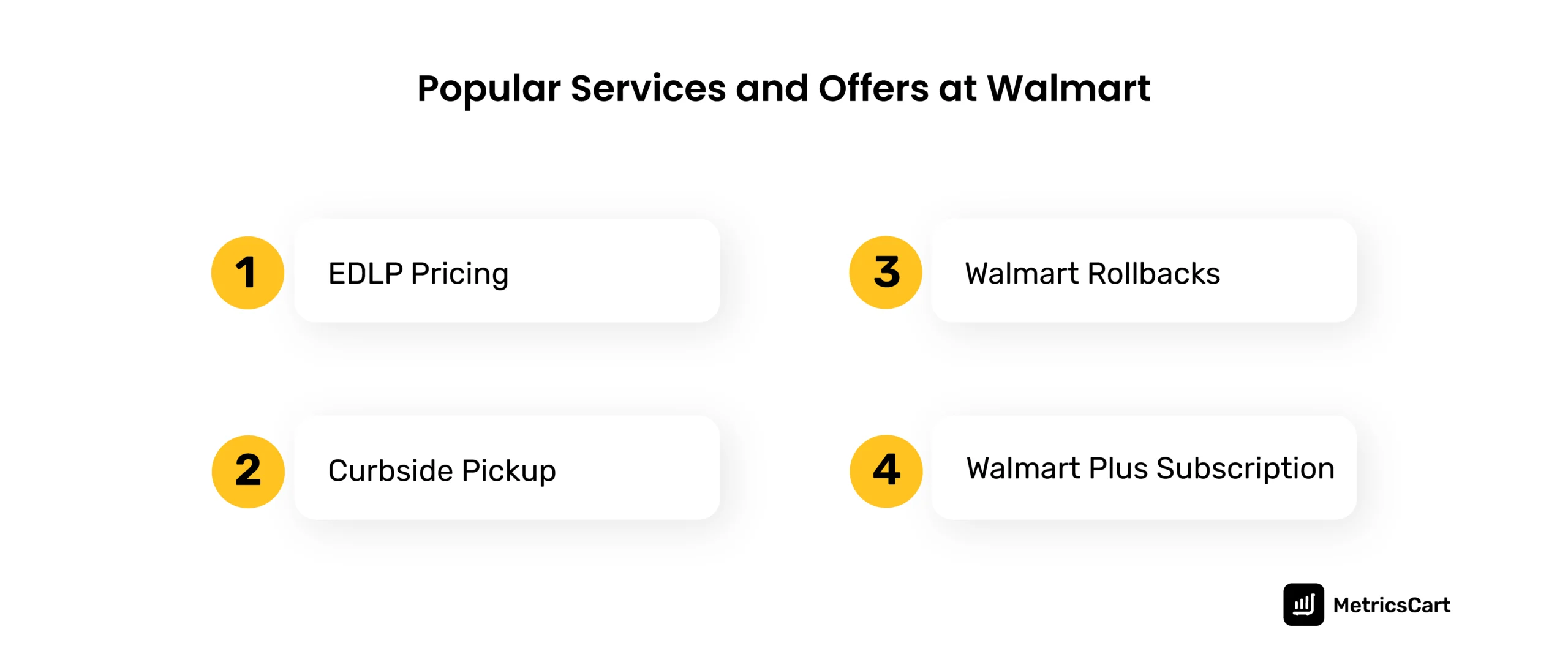
COVID-19 and Walmart’s Consumer-First Measures
The pandemic has drastically changed the shopping experience of the average consumer. This has also affected Walmart, which had to adapt by implementing consumer-centric strategies that followed COVID protocol guidelines.
Curbside pickup, Walmart Fulfillment Services (WFS), BOPIS (Buy Online Pick-up In-Store), etc., were Walmart’s effective measures to combat consumers’ inability to reach physical stores and to maintain a safe distance. Walmart’s online shopping also doubled during the COVID phase as this was more convenient for consumers.
Inflation Scare and How Walmart Took Consumers Into Confidence
The US economy has been battling inflation, and consumer spending has taken a huge hit. However, this doesn’t affect Walmart as they keep their promise of lower prices even when their competitors have increased prices to take on the inflation effect.
Walmart has also maintained its rollbacks through its physical stores and online marketplace. Rollbacks are temporary price reductions on items, and they are the equivalent of a sale. These strategies have been working out well with consumers even when they are choosing to spend less during the inflation scare.
Walmart Plus
Similar to Amazon Prime, Walmart offers Walmart Plus, a subscription service that comes with various benefits like free shipping with no order minimum, early access to deals, easy returns, unlimited grocery delivery, and more.
Walmart Plus subscription also provides fuel discounts at Sam’s Club gas stations. Subscription for Walmart Plus is available at $98 per year or $12.95 per month.
Walmart Connect
Walmart Connect is the advertising wing of Walmart. In 2023, around $3.4 billion was generated from Walmart Connect services. It is the second-largest digital retail media network in the US after Amazon. Walmart Connect helps advertisers reach their targeted audience through multiple channels, including online ads, sponsored content on the web, and in-store advertising.
In-store advertising is a growing market compared to online ads. Walmart Connect has found a business strategy that vastly improves sales figures by placing digital ads in different store departments. This increases the visibility of brands and encourages purchase decisions for consumers.
Walmart App
The Walmart app includes augmented reality (AR) capabilities, allowing customers to visualize products in their own spaces and enhancing the decision-making process.
Upon entering a Walmart store, the app switches to Store Assistant mode, providing immediate access to features like a barcode scanner, product search bar, customer reviews, and Walmart Pay.
Walmart also utilizes Generative AI to help customers find desired products quickly and make confident purchase decisions.

Walmart in E-Commerce: Things Sellers Should Keep In Mind
Despite being a relatively new player in the market, Amazon took over the online retail space with a massive market share. Walmart also started its e-commerce marketplace, Walmart.com, competing with Amazon to provide consumers with a large pool of products and services.
The success of any seller hoping to rake profits at Walmart depends on their analysis of consumer’s shopping habits at Walmart. An online Walmart seller can increase their sales through:
Friendly Return Policies
Walmart consumers expect a value-oriented shopping experience that includes a hassle-free return policy. A consumer can order a product from the Walmart e-commerce website, and if it doesn’t meet their expectations, Walmart will handle the return process, making the whole transaction stress-free for the consumer.
Brand Awareness Through Social Media
Consumers are influenced by social media, and they make buying decisions based on online recommendations. Walmart suggests its sellers use social media influencers, posts, personal reviews, etc., to create brand awareness and share relevant product information.
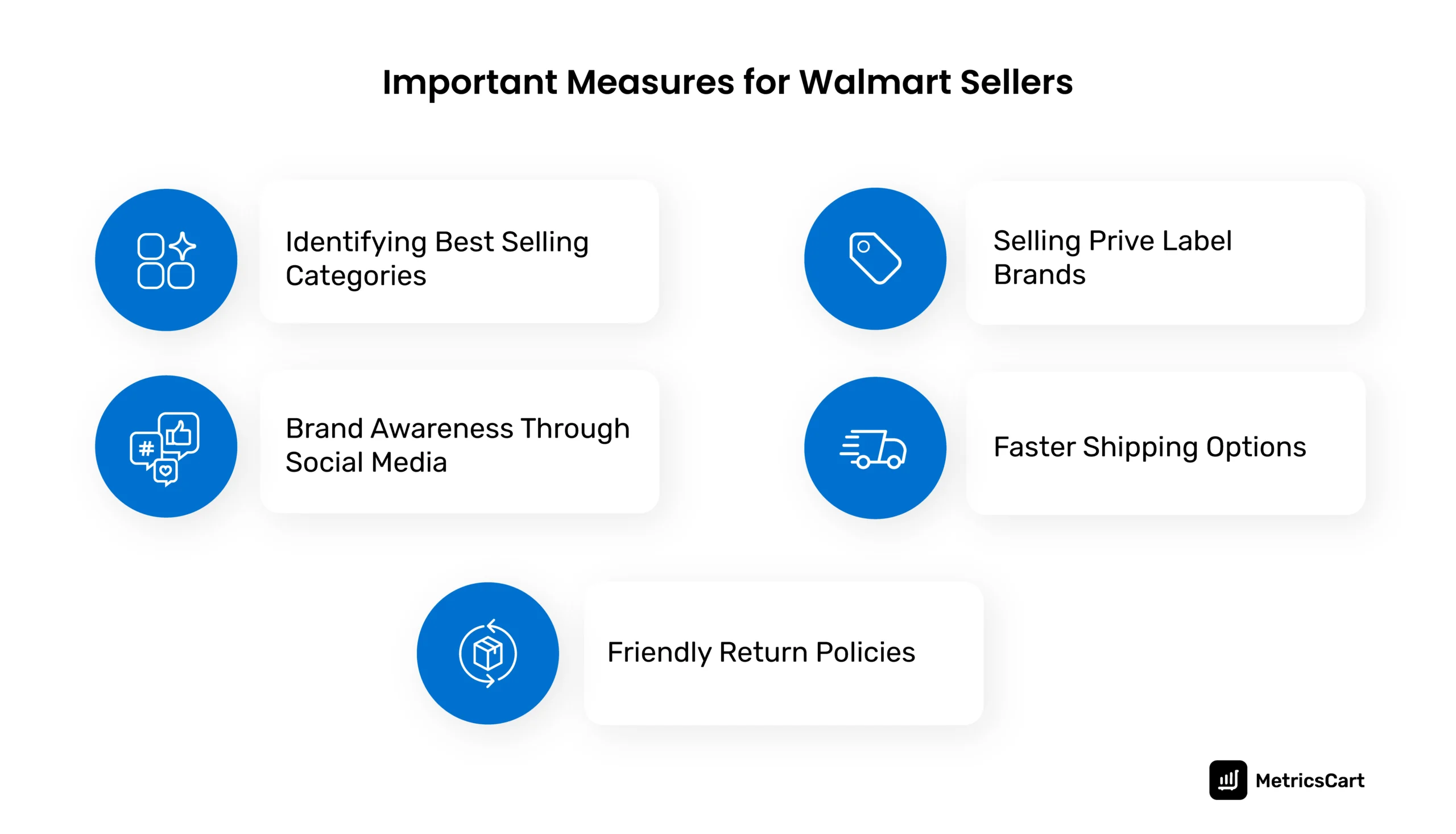
Fast and Efficient Shipping Options
A 2023 Klarna survey found that 63% of millennials and 52% of Gen Z would opt for online shopping over physical shopping. Express and free shipping options are crucial as they are one of the major factors that influence a young consumer’s choice of Walmart.
Identifying Best Selling Categories
Walmart marketplace data shows that baby care, personal care, and cleaning supplies are the three top-selling categories at Walmart. This data also helps sellers decide what products they should offer through Walmart.
Selling Private Label Brands
Private label brands consist of products available in the market but renamed and sold by a particular company under their brand name. Walmart has a line of products under its private label branding, and this can be a haven for sellers as competition would be less and achieving the buy-box would be easier.
READ MORE | Interested to know more about Walmart’s private label brands? Check out our blog on Exploring Walmart Private Label Brands.
The Future of Walmart: Joining the AI Revolution
Major global retailers like Walmart, Amazon, etc., have been providing consumer service through cutting-edge technology. Amazon, with its dynamic pricing strategy enhanced through Machine Learning (ML) capabilities, has been at the forefront of the game.
Walmart has also implemented its own AI-driven services for consumers and employees. Walmart’s inventory management systems, with the help of Artificial Intelligence, monitor SKU levels in real-time, enabling quick stock replenishment.
AI and ML also enable a transparent supply chain optimization resulting in faster deliveries. Walmart also offers Gen AI-powered search tool, Walmart Voice, etc., for consumers to make their shopping focused and convenient.
Apart from these innovations, Walmart is planning to introduce digital shelf labels to its physical stores, which will reduce the time needed for manual price changes, enable faster product identification, and ensure a better shopping experience.
READ MORE | Confused about where to sell your products? Amazon or Walmart? Check out our blog Walmart vs. Amazon: Which Online Marketplace is Better For Sellers?
Conclusion
It is clear from the above examples that consumers prefer to shop from a marketplace that offers them value and convenience. Walmart consistently fulfills this expectation, leading to its success as a worldwide retailer. Committing to creating consumer-friendly offers and prices dictates effective analysis of ratings and reviews. So that brands and sellers know the consumer’s likes and dislikes.
MetricsCart offers a wide choice of digital shelf intelligence tools that help your brand stay on top. So why wait? Get on a discovery call with us and create new success stories for your business.
Want To Skyrocket Your E-Commerce Sales? Get the Best Digital Shelf Analytics Solution!

